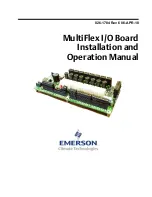
PAV-SIPA1SM | 009-1803-01 | 190820
45 Perseverance Way, Hyannis, MA 02601
Copyright © 2019 Savant Systems, LLC
2 of 2
| 508.683.2500
Speaker Connections
Speaker wiring connections are made
using 4-pin Speaker Connectors
supplied with the device. The wire slips
into the hole and locks with the screw
located at the top of the connector.
Speaker connectors accept up to
12AWG speaker cable
–
Wire order shown does not
represent any specific wiring
standard. It may differ from one
deployment to another.
IR Wiring
IR connections are made using 6-pin
IR Connectors supplied with the
device. The wire slips into the hole
and locks with the screw located at
the top of the
connector.
IMPORTANT: IR Wiring Precautions
–
Ensure that all IR emitters are within 15 feet (4.6 meters) of the
controller’s location.
–
Use of 3rd party blinking IR emitters with Talk Back is not
recommended. These types of emitters can draw voltage away
from the IR signal that can degrade IR performance..
Serial Connections (RS-232)
NOTES
:
–
Wire colors shown do not represent any standard.
–
CTS/RTS handshaking for flow control is not supported.
–
For further details on RS-232 serial control adapters,
conversion, and wiring, refer to the
and RS-422/485 Pinout Reference Guide
Serial Communication Troubleshooting Guide
on the Savant
Customer Community.
Installation
The IP Audio 1 includes side-mounting brackets for installation in a
structured media panel, enclosure, or on a wall. The unit can also be
placed on any flat surface, such as a table or shelf, or can be combined
with an optional rack mounting kit (RMB-SIPA12F-00) which allows 2
units to be placed side by side in a standard 1U rack mounting.
Serial connections are made
using 6-pin connectors
supplied with the device.
The wire slips into the hole and
locks with the screw located at
the top of the
connector.
Network Requirements
All Savant devices must be connected to the same local area network
(LAN) or subnet as the host. Savant recommends not implementing
any type of traffic or packet shaping in the network topology, as this
may interfere with performance.
IMPORTANT!
It is recommended that the PAV-SIPA1SM be connected to
an AVB switch. This is required for AVB distribution of audio
content.
Network Configuration
To ensure that the IP Address will not change due to a power outage,
a static IP Address or DHCP reservation should be configured. Savant
recommends using DHCP reservation within the router. By using this
method, static IP Addresses for all devices can be managed from a
single UI, avoiding the need to access devices individually.
Setting DHCP reservation varies from router to router. Refer to the
documentation for the router to configure DHCP reservation. Refer to
the Savant IP Audio Deployment Guide (009-1571-xx) located on the
Savant Customer Community
for more information.
Replacing the Fuse
ELECTRIC SHOCK HAZARD!
Disconnect the unit from AC power
by removing the power cord from the AC outlet and the unit
before replacing the fuse.
1. Disconnect the unit from AC power by removing the power cord.
2. Remove the fuse cartridge by pulling the tab marked
A
in the
image below.
3. Remove the old fuse from the cartridge and discard.
4. Gently clip the new fuse into the cartridge, and slide the cartridge
part-way into the receptacle, ensuring that alignment is correct.
5. Press cartridge fully into receptacle, ensuring that it is seated and
secure.
A
NOTE
: If any resistance is encountered while seating the cartridge,
DO NOT apply more pressure. Stop pressing on the cartridge,
remove it, verify that the fuse is properly seated, align cartridge
carefully, and reinsert.
Further Product Information
To view available documentation, detailed product specs, and more:
–
Visit the Savant Knowledge tab via the
to search all Savant documentation.
Optional Accessories
The PAV-SIPA1SM can be combined with an optional rack-mounting kit
(RMB-SIPA12F-00), which allows 2 units to be installed side-by-side in
a 1U rack mounting. Check the
for details and purchasing
information.
Pin 1
Right -
Pin 2
Right +
Pin 3
Left -
Pin 4
Left +
- R + - L +
4
3
2
1
Use white stripe
for positive (+)
4
3
2
1
Pin 1
IR 1 -
Pin 2
IR 1 +
Pin 3
IR 2 -
Pin 4
IR 2 +
- 1 + - 2 +
Pin 5
IR 3 -
Pin 6
IR 3 +
6
5
- 3 +
Pin
RS-232 1 Ground
Pin
RS-232 1 Transmit
Pin
RS-232 1 Receive
Pin
RS-232 2 Ground
4
3
2
1
6
5
Pin
RS-232 2 Transmit
Pin
RS-232 2 Receive
1
2
3
4
5
6



















